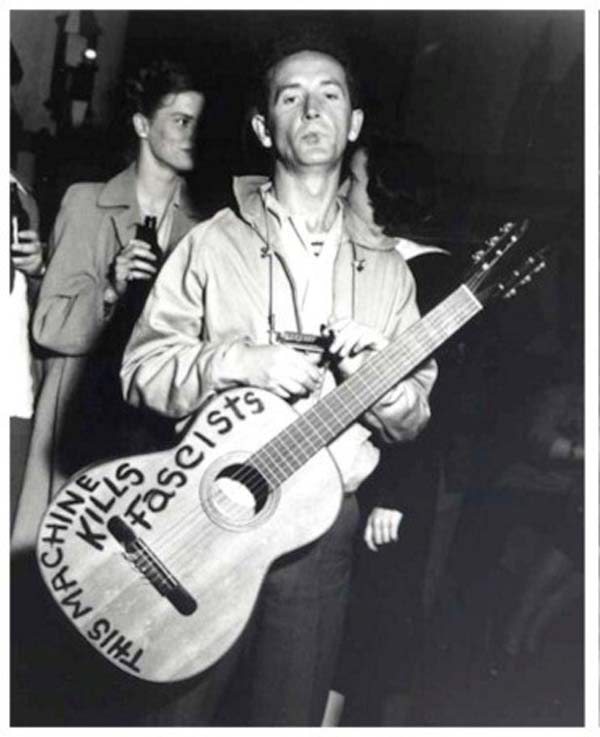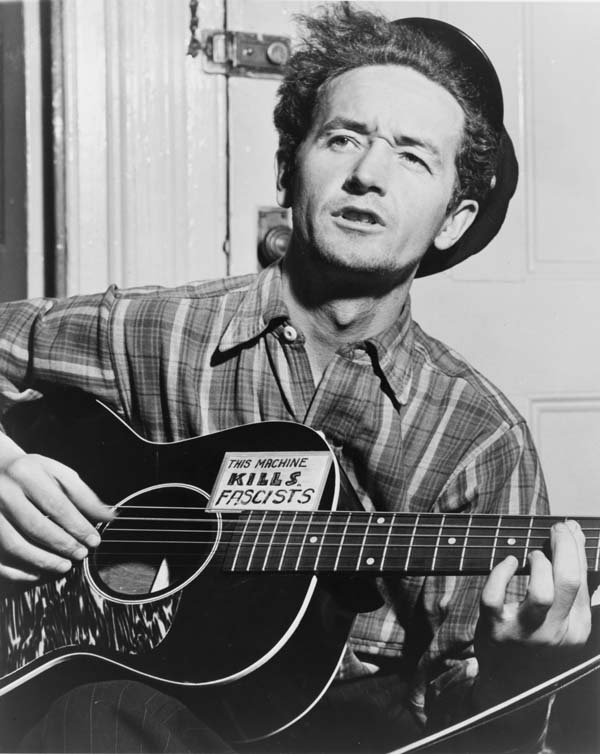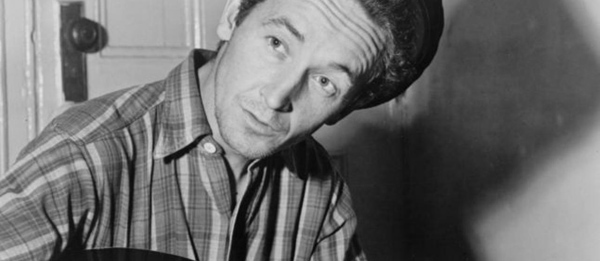Maria Kaparaki
Woody Guthrie, singer, songwriter and performer was born on this day, July 14, 1912. On this occasion, we republish an article originally written for Xekinima.
The American singer, songwriter and performer Woody Guthrie (1912-1967) was one of the most important figures of American folk and country music, and certainly one of the greatest representatives of the American political music of the 20th century. It is no coincidence that many great musicians – some of them with a strong political footprint – such as Bob Dylan, Johnny Cash, Bruce Springsteen, Pete Seeger, Billy Bragg, Joe Strummer, etc., recognize him as a major source of influence.
Woody Guthrie was born at the beginning of the 20th century in Oklahoma to a small-town farming family, which was quick to feel the effects of the 1929 global depression. From an early age, Guthrie had no choice but to survive on his own with his siblings when his mother was hospitalised in a mental institution and his father emigrated to Texas to find work (as did large parts of Oklahoma’s rural population at the time). He had been working odd jobs in Oklahoma since his teens, and at 18 he immigrated to Texas himself to join his father and look for work.

A musician at the heart of the class struggle
Guthrie found himself early on in the heart of the US working class, working in the American countryside himself as a seasonal worker. He experienced first-hand the poverty, exploitation, and class struggle that became the raw material for so many of his songs. At the same time, at a young age he organised himself into the Communist Party of the USA. His contact with labour-union struggles and the communist movement had a catalytic influence on him both as a person and as a songwriter. On the one hand, these experiences helped him realise the extent of inequality and exploitation existing in society:
‘They made me understand why I had to keep going around with my guitar, writing songs and singing them. Until that moment I didn’t know that humanity was so big, that the struggle was so great and unequal…”.
On the other hand, he got to know the power and militancy of the great workers’ struggles and strikes of the 1930s. After all, he himself was often present and played pro bono at strikes and rallies.
Moreover, at a time when racism was on the rise in the United States and the Ku Klux Klan was rampant, Guthrie did not hesitate to take a stand against fascism and racial discrimination; this battle was not over with the end of World War II and the defeat of Nazis. Guthrie had already released some of his first anti-fascist songs at the beginning of his career. After all, one of the things that will always link him to the anti-fascist movement worldwide is the fact that in the early 1940s he wrote the historic phrase “This machine kills fascists” on his guitar, a message that is undoubtedly his emblem.
At the same time, Guthrie kept an eye on a series of struggles being fought by the working class around the world. For instance, he was following the developments of the Greek civil war, and the great anti-fascist battle being fought by the guerrillas in the Greek mountains. According to research by the journalist Aris Hadjistefanou, Woody Guthrie also wrote lyrics about the Greek Civil War, which were never set to music:
“I am a Greek worker and warrior. I passed between bombs and dynamite and saw my street and my city blown up. And now, the same black cops walk around me. I fought the fascists, but they didn’t even change their uniforms. They still walk next to me…”.
In addition, evidence from other research shows that Guthrie had written a series of songs against the fascist regime of Franco in Spain in the early 1950s; neither these were recorded or published at the time.

“Whatever colour you are, whatever kind of person you are, this world is yours”
Woody Guthrie’s work includes thousands of songs of historical, political (and other) content and constitutes an important legacy for the global labour and anti-fascist movement. Disobedient, talented, militant, he never hesitated to take on the system and express the right of the underdog and the oppressed, the right of his class.
“I hate a song that makes you think you’re worthless. I hate a song that makes you think you’re just doomed to lose… …I’m on the road to sing songs that will prove to you that this is your world, even if you’ve been treated harshly and kicked down a dozen times. Whatever colour you are, whatever kind of person you are, I’m on the road to sing songs that will make you feel proud of who you are and what you do. The songs I write are made for all the people who are just like you.”
Here are some of Woody Guthrie’s best songs:
This Land Is Your Land, 1940
Perhaps his best-known song, associated more than any other with the struggle for land and freedom. Guthrie originally titled the song “God Blessed America for Me” in response to Kate Smith’s propaganda song “God Bless America” that was played repeatedly on American radio in the late 1930s.
Vigilante Man, 1940
With the term “Vigilante Man”, Guthrie refers to the armed groups of thugs used by the employers of large corporations (General Motors, etc.) to attack and break strikes in factories in the 1930s.
1913 Massacre, 1941
One of the dozens of songs Guthrie wrote about coal miners. On Christmas Eve, 1913, Michigan miners were already in their fifth month of a strike and celebrated with their families at the Italian Hall entertainment centre. Employers sent goons and scabs into the building, who yelled “Fire!” to cause panic, and then kept the doors of the building closed. 73 workers, women and children were trampled to death.
You Fascists Are Bound to Lose, 1944
“I’m gonna tell you fascists
You may be surprised
The people in this world
Are getting organised
You’re bound to lose”
Two Good Men, 1946
Written for Nicola Sacco (1891-1927) and Bartolomeo Vancetti (1888-1927), two Italian anarchist immigrants to the United States who were convicted of robbery and murder in a mock trial. They were executed, though innocent, in August 1927.
Ludlow Massacre, 1958
Dedicated to the magnificent miners’ strike that took place in spring 1914 at the town of Ludlow, Colorado, USA. At the employer’s request to the governor of Colorado, the National Guard attacked the strikers, shot them at point-blank range and set fire to their camp, resulting in dozens of deaths. After the Ludlow massacre, guerrilla warfare broke out across the state between the workers and the National Guard that lasted 10 days.
Tear The Fascists Down
“There’s a great and a bloody fight ’round this whole world tonight
And the battle, the bombs and shrapnel reign
Hitler told the world around he would tear our union down
But our union’s gonna break them slavery chains”












